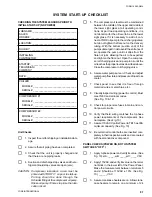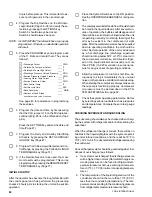
92
YORK INTERNATIONAL
LD02099
FIG. 31 – PIPING DIAGRAM
activated, the micro will keep the solenoid energized until
the leaving water temperature rises above the high limit
of the Control Range or until the load becomes so low
that the hot gas can no longer keep temperature within
the control range and the micro turns the compressor
off. Details for setting the pressure regulator follow.
RWT Control Hot Gas Operation
The hot gas solenoid is energized if the compressor is
on its minimum stage of loading and the return water
temperature falls below the following point:
ULCR - CR + CR/20
Where: UCLR = Upper Limit of Control Range
CR = Control Range Differential
Example:
In a typical system that requires a 45°F
(7.2°C) leaving water temperature, we will
have a 10° control range (CR) differential
which gives us an Upper Limit of Control
Range (ULCR) of 55°F (12.8°C). Therefore,
plugging the numbers into the formula:
55 (12.8°C) - 10 + (10/20) = 45-1/2°F (7.5°C)
The hot gas solenoid will be activated at 45-1/2°F (7.5°C)
in the example above and hot gas may then be fed ac-
cording to the suction pressure and the pressure regu-
lated valve setting. Once activated, the micro will keep
the solenoid energized until the return water temperature
rises above the temperature designated by the formula:
ULCR - CR + CR/10
Where: UCLR = Upper Limit of Control Range
CR = Control Range Differential
Example: 55 (12.8°C) - 10 + 10/10 = 46°F (7.8°C)
If temperature continues to drop while the Hot Gas is
energized, the Hot Gas will be de-energized when the
compressor cycles off on temperature.
Procedure For Setting The Hot Gas Regulator
(Ref. Fig. 31)
1.
If desired, set the control panel data to show suction
pressure.
2.
Adjust the pilot power assembly adjustment screw
2 to approximately the middle of its adjustment
range.
3.
The chiller must be running and stabilized on the
minimum stage capacity. In establishing this condi-
tion, it may be necessary to deactivate the regulator
by de-energizing the solenoid 1 .
4.
Adjust the adjustment screw 2 in the clockwise
direction to open the valve at a higher pressure
(sooner) or in the counterclockwise direction to open
the valve at a lower pressure (slower response). The
valve is feeding when the valve outlet feels warm to
the touch.
The adjustment is correct when system suction pres-
sure rises to a point nearly equal to normal running
pressure at the midpoint in the “Control Zone”.
5.
Further minor adjustment may be necessary to be
certain that the valve opens fully before the tempera-
ture point at which the compressor stops due to a
fall in Return or Leaving Water Temp.
6.
Repeat this procedure on the other system.
NOTE: Hot gas should not be considered as an addi-
tional step of unloading when programming the
number of steps of loading/unloading.
Summary of Contents for Millennium YCAJ150
Page 21: ...FORM 150 65 NM4 21 YORK INTERNATIONAL LD02461 FIG 6 ELEMENTARY DIAGRAM Cont d...
Page 22: ...22 YORK INTERNATIONAL ELEMENTARY DIAGRAM...
Page 24: ...24 YORK INTERNATIONAL CONNECTION DIAGRAM FIG 7 CONNECTION DIAGRAM LD02463...
Page 25: ...FORM 150 65 NM4 25 YORK INTERNATIONAL FIG 7 CONNECTION DIAGRAM Cont d LD02462...
Page 30: ...30 YORK INTERNATIONAL FIG 8 SYSTEM WIRING Cont d LD02499...
Page 100: ...100 YORK INTERNATIONAL LD02654 FIG 37B LOUVER BRACKETS INSTALLATION...
Page 103: ...FORM 150 65 NM4 103 YORK INTERNATIONAL LD02656 FIG 39A LOUVER INSTALLATION SIDES...
Page 104: ...104 YORK INTERNATIONAL LD02654 FIG 39B LOUVER BRACKETS INSTALLATION...
Page 108: ...108 YORK INTERNATIONAL FIG 40B CONDENSER COIL LOUVER INSTALLATION FRONT AND BACK LD02659...
Page 110: ...110 YORK INTERNATIONAL FIG 41 REMOTE RESET BOARD LD02666 P1...






























